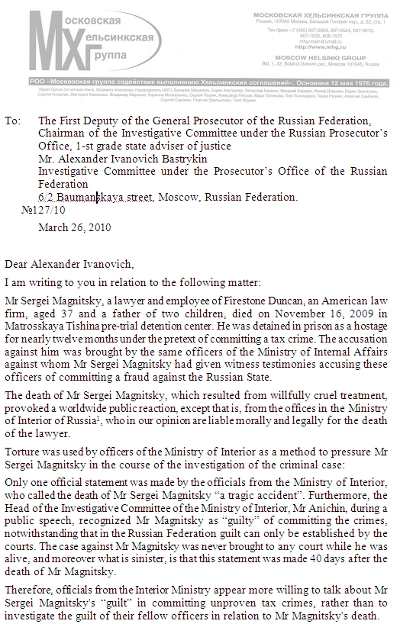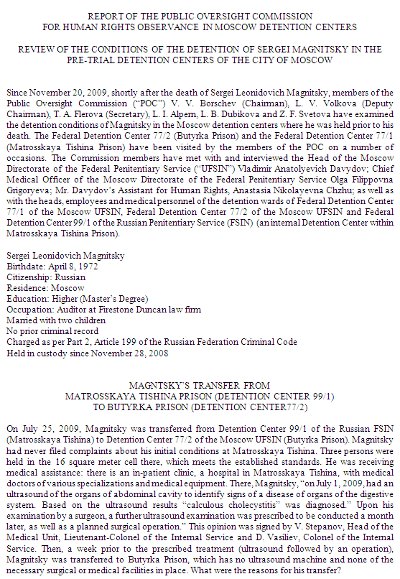The Russian Investigative Committee is trying to close the investigation into the death of Sergei Magnitsky, but is afraid to do it outright.

The official statements of the Russian Investigative Committee about the investigation into the death of Sergei Magnitsky contradict each other and seem strange to say the least.
Almost a year ago after the intervention of President Dmitry Medvedev, the Russian Investigative Committee was forced to open a criminal case into the death of Magnitsky in pre-trial detention.
This was done with great reluctance, and therefore it was not done properly. A criminal case was opened in connection with the alleged negligence of employees of the prison. In this form it was not viable, that was obvious to anyone who was at least a little familiar with the matter. There can be no negligence where there was a clear and firm intention.
Magnitsky did not die because of “an oversight”, but rather, because he was too closely looked after.
The conditions of his detention were quite deliberately worsened to coerce him into giving the “right” testimony. For the same reason, when he became ill, he was refused adequate treatment. In general, this is not particularly secret. Decisions were taken by the investigators and detectives; jailers and other prison employees were simply implementers, including those in white coats.
From day one the investigation was a bad farce.
It was like a performance in which the investigator walks through a room where a corpse is lying on the floor with a bullet hole through its head, which the investigator does not notice, and he carefully examines the stove for leaks of carbon monoxide, which could have killed the man.

This performance reached its high point with Lyudmila Alekseeva, who in March 2010, without waiting for the farce to end, called a spade a spade: the killers – murderers, robbers and scammers who had arrested and killed a man to hide their crimes. Alekseeva sent the Russian Investigative Committee a complaint about opening a criminal case targeted not so much against the performance of doctors, as against the investigators who give them orders. She was referring to the results of the Moscow Public Oversight Commission, which has conclusively proved that Magnitsky was deliberately murdered by law enforcement officers interested in his death, who created torturous conditions for him during his pre-trial detention in prison.

According to the law, a reply to this complaint must be given within 3 days.
The reply is a very simple matter – “Yes, there are grounds to initiate an investigation”, or “No, there is nothing to investigate.” All that is required within this time is a decision to initiate an investigation, rather than carrying out the investigation itself, which, of course, can drag on, God knows how long. But it turned out that this simple decision was beyond the Russian Investigative Committee. Moreover, it has thrown the entire investigative system into a sate of stupor.
First, Alekseeva’s complaint was sent as low down the chain as possible.
It ended up with an investigator of the Investigation Division of the Tver district of Moscow with the surname Trikulya. One can argue that his handling of the complaint was either brilliant or incompetent, depending on what his bosses had asked him to do. However, his editing skills were unquestionably sub par. Instead of three days, three months went by, but law be damned, important decisions should not be made quickly!
Upon receiving Lyudmila Alekseeva’s complaint, Investigator Trikulya of the Russian Investigative Committee, sent it for review by a number of authoritative experts – namely: Oleg Silchenko, Artem Kuznetsov and two of his subordinates, all of whom were directly involved in organizing the arrest Magnitsky.
These reviewers all had explanations of why they shouldn’t be investigated. We cannot know for sure what Trikula was thinking. Maybe he was just convinced by the strength of their arguments? In any case, Investigator Trikula diligently copied their answers into his report as though they were his own findings and as though he himself had independently considered Alekseeva’s request and had decided to refuse to open the case, finding that there was nothing to investigate. True after a few pages into his report he got careless and neglected to change all the officers’ first person statements about themselves into his own third party findings, (therefore much of Trikulya’s report is just written by the officers themselves in the first person); but what was the point of hiding this anyway? In these dark days of lawlessness, if you can’t trust your fellow law-enforcement officers in the MVD, who can you trust? Besides, who among us was never helped with their homework?
Immediately after the press announced the refusal to initiate criminal proceedings on the application of Ludmila Alekseeva the public expressed its outrage and its demand for a murder investigation. The Russian Investigative Committee press office therefore announced that the leadership of the Russian Investigative Committee had cancelled Trikulya’s decision. This didn’t mean that there would be a murder investigation; it just meant that it was too early to say that there wouldn’t be one.
This time to show that they were serious, low level staffers were not used, and the case, whether to open the case, was assigned to one of the best investigators Sergei Golkin in the central administration of the Russian Investigative Committee. But what can even the best investigator do when the assignment given is not to uncover, but to bury deep, so that no one can uncover?
This seasoned investigator took the same three months to consider investigating Alekseeva’s complaint, as Trikulya, but the result was the same.

On the 7th of September 2010 the head of the Russian Investigative Committee, Mr. Alexander Bastrykin, said in respect of death Magnitsky that “considering the findings of forensic experts and the Cardiology Research Complex, and the Ministry of Public Health on the causes of his death, there is no reason to believe that it is associated with the actions of officials carrying out his criminal prosecution.”
This statement raises many questions:
Firstly, how can this conclusion can be made just on the basis of the forensic medical examination?
Ultimately, all people die from heart failure. The question is what has caused heart failure. Magnitsky was not treated, and he consequently died. If he was treated and kept under normal conditions (at least like those before July 2009, when he was transferred to Butyrka and become “pressured”), he would still be alive. What relevance are the conclusions of forensic medical expertise for among other things, addressing the questions of whether Magnitsky was illegally arrested, the refusals to provide the treatment prescribed by prison doctors, and the creation of tortuous conditions of detention?
Secondly, the new expertise was carried out on the results of the written autopsy report conducted by the prison pathologist immediately after Magnitsky’s death. That is, it was a secondary examination of questionable documents within the frame work of questions asked by the investigator. Let me remind you that the coroner changed the cause of death from Pancreatitis (the condition Magnitsky was refused treatment for in detention) to heart failure after the press pointed out that the diagnosis of death from Pancreatitis made it clear that the refusal of medical treatment was what killed him. I also have to point out that after this abrupt change in the official cause of death, the Prosecutor refused to grant Sergei’s mother a second independent autopsy. So what can this so-called new medical expertise tell us? It is doomed to repeat the official conclusions of those who did the autopsy: in these cases what coroner “input”, is bound to be the “output.” No matter how esteemed the new medical experts are, they can only analyze the information they are given.
Third, and most importantly, what actually happened to Ludmila Alekseeva’s complaint?
Until now, there has been no clear answer whether her complaint will ever be investigated.
Thus, we see how skillful hands bring the case regarding a murder to a planned standstill.
As you might expect the Russian Investigative Committee finds no negligence on the part of doctors. This is natural, because they had nothing to do, while the police acted. But that’s what Alekseeva stated in her complaint when she asked to initiate criminal proceedings against members of the police in connection with the unlawful arrest, torture and premeditated murder of Magnitsky.
The Russian Investigative Committee continues to remain silent on this issue of intent because it’s checking if the public has forgotten about Alekseeva’s complaint or not.
Bastrykin’s last statement was that this new and totally worthless expertise supporting a diagnosis of heart failure seems to exonerate the people involved in Magnitsky’s criminal prosecution. He was essentially testing the waters to see if Alekseeva’s request for a murder investigation could be refused. His statement resulted in universal outrage and ridicule.
So on September 16th, 2010 the Russian Investigative Committee backtracked and hastened to reassure people that the investigation would continue but the statement was misleading for anyone who doesn’t know or remember what Alekseeva has asked them to investigate and infuriating for those of us who do know. They said that it has been determined that the doctors and investigators were not at fault, but the investigation of the negligence case will continue. Of course the issue of negligence is what’s really at issue.
Again, no new word on the fate of Alekseeva’s application. The year is drawing to its finale, and the seasoned investigators still have not made a decision whether or not to open an investigation against the investigators for false arrest and the intentional creation of conditions that led to Magnitsky’s death.
In fact, all the decisions were made long ago.
Of course, nobody in the Russian Investigative Committee wants to open this case. The investigation has one purpose – a cover up. But because of increased public awareness and the continuing wave of revelations it is not easy to avoid opening a case. That forced the Russian Investigative Committee throw trial balloons, making conflicting statements: announcing the end of the investigation, then when faced with outrage, overturning these statements to reassure public opinion.
The plan is really simple.
They hope that sooner or later Sergei’s death will be forgotten, superseded by other tragedies in people’s minds, and then they can finally close this business. It is hopeless plan. We could not prevent Sergei’s death, but we will not let the matter die. No one will be forgotten and nothing will be forgotten! займ на карту unshaven girls https://zp-pdl.com/emergency-payday-loans.php https://www.zp-pdl.com займ на карту срочно без отказа
To learn more about what happened to Sergei Magnitsky please read below
- Sergei Magnitsky
- Why was Sergei Magnitsky arrested?
- Sergei Magnitsky’s torture and death in prison
- President’s investigation sabotaged and going nowhere
- The corrupt officers attempt to arrest 8 lawyers
- Past crimes committed by the same corrupt officers
- Petitions requesting a real investigation into Magnitsky's death
- Worldwide reaction, calls to punish those responsible for corruption and murder
- Complaints against Lt.Col. Kuznetsov
- Complaints against Major Karpov
- Cover up
- Press about Magnitsky
- Bloggers about Magnitsky
- Corrupt officers:
- Sign petition
- Citizen investigator
- Join Justice for Magnitsky group on Facebook
- Contact us
- Sergei Magnitsky
Place your comment
Please fill your data and comment below.